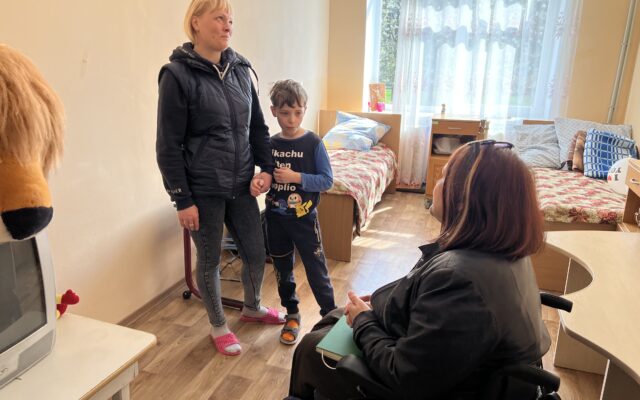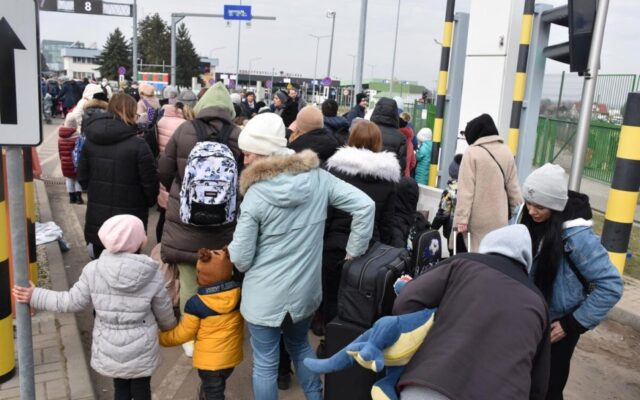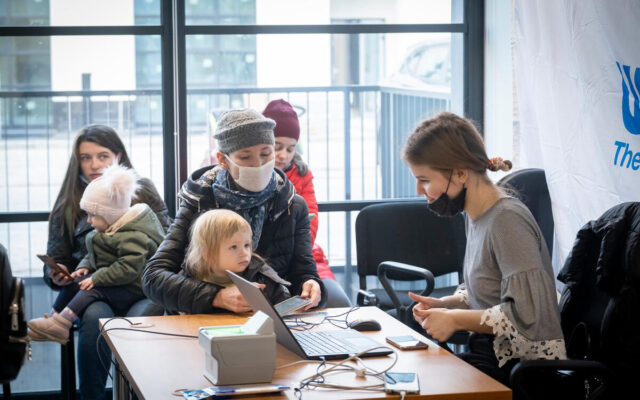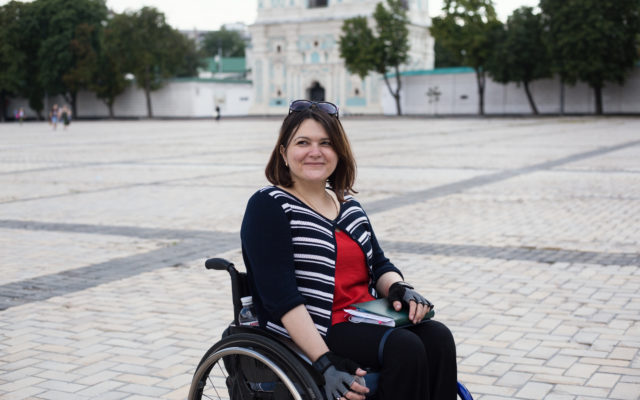‘I just can’t stand aside if I know that I can help’
Disability rights activist Tetiana Barantsova escaped the war in Ukraine in a wheelchair. Now she’s helping others with disabilities to do the same.
19.07.2022
© UNHCR/Igor Karpenko
Messages asking for help can appear on Tetiana Barantsova’s phone at any time of the day or night. This one comes via the messaging app Telegram from a bomb shelter in Sievierodonetsk, a city in eastern Ukraine that is under intense bombardment.
“It is cold here and we don’t have water, there are no beds or mattresses or blankets, the city is constantly bombarded,” reads the message. “Please, please can anybody help us get out of the city? I hope this SMS will reach you.”
The message is from Olha Chernozhukova, a 32-year-old woman with a spinal injury that confines her to a wheelchair. When the war started, she stayed in the home she shared with her 73-year-old mother on the outskirts of Sieverodonetsk, even after their electricity and gas supplies were cut off. But after a shell landed in their neighbour’s yard and another killed their friend’s 3-year-old daughter, volunteers took them to a bomb shelter in the city. From where she lay on wooden pallets on the floor of the shelter, Olha could still hear shells landing above them.
“I thought we would be buried alive there,” she said later. “I just felt horror.”
Like many people with disabilities living in Ukraine, Olha had Tetiana’s number in her phone.
“Maybe I called Tetiana a million times,” she recalled. “I was just looking at my mother, who seemed to have aged by 10 years, and I was calling and calling.”
“Tetiana and her colleagues are our angels. They saved our lives.”
As soon as Tetiana received Olha’s message, she began working her contacts with local officials and NGOs in the Luhansk Oblast where Sieverodonetsk is located. By the next day, Olha and her mother were on a train to Lviv in western Ukraine where Tetiana had arranged for them to stay at a rehabilitation centre for people with disabilities.
“I cannot tell you how grateful I am,” said Olha, after she and her mother had arrived safely in Lviv. “Many people pray and thank God and the angels for saving them. In my case, Tetiana and her colleagues are our angels. They saved our lives.”
Tetiana has been helping people with disabilities escape conflict areas and restart their lives in safety since 2014, when she was forced to flee her home city of Luhansk in eastern Ukraine. A wheelchair user herself, she and her husband, Oleksiy Soroka, who also uses a wheelchair, and their 8-year-old son, Pavlo, struggled to reach a basement where they could take shelter during an air raid. After eventually escaping by road, Tetiana set about organising the evacuations of other people with disabilities. She turned her phone number into a hotline for those trapped in conflict zones and helped some 5,000 people to safety.
For her work in 2014, and as the founder of Ami-Skhid, a regional network of NGOs that helps Ukrainians with disabilities, she was chosen as the regional winner for Europe of the 2020 UNHCR Nansen Refugee Award, a prestigious annual prize that recognises those who have gone to extraordinary lengths to support forcibly displaced or stateless people. The government also named her its commissioner for the rights of people with disabilities.
Since then, Tetiana has been advocating for more services and support for the estimated 6.6 million Ukrainians with disabilities. Her efforts were paying off, but by January of this year, she “sensed that something very bad is coming”.
“After my first displacement in 2014, I knew – we need to prepare.”
She began meeting with different ministries and state services to discuss how they would evacuate and support people with different types of disabilities in the event of an attack. “A person with hearing problems cannot hear the sound of sirens. A blind person cannot read the sign ‘Bomb Shelter’. All possible scenarios were thought of,” says Tetiana.
But the scale of the war that started on 24 February took everyone by surprise. “In 2014, at least we knew quite clearly which oblasts were safe to send people to. On 24 February, explosions were heard throughout Ukraine. The panic had started.”
“In half an hour there were 18 people who needed help.”
Tetiana, Oleksiy and Pavlo, now aged 16, could hear the familiar sounds of war from the 24-storey apartment building where they lived in Boryspil, a city in the Kyiv region.
“We decided to leave immediately,” says Tetiana. “We made calls to people with disabilities who were living close to us, and in half an hour there were 18 people who had no means to leave and needed help.”
She and Oleksiy squeezed as many of them as they could into their specially adapted mini-van and drove west. Their passengers included eight children with disabilities, a 2-week-old baby, three wheel-chair users and an 85-year-old woman. At one point the van broke down and they spent hours looking for help. When they finally reached their destination – the home of a friend in western Ukraine – the house was already full, and they decided to continue to Latvia where another friend of Tetiana’s helped them find rooms at a centre run by the Latvian Samaritan Association.
Satisfied that she had left the group in good hands, Tetiana returned to Ukraine with Oleksiy to help transport others to safety. They made several trips back and forth, spending long hours on the road, until Oleksiy collapsed and had to be admitted to hospital in Latvia.
Now Tetiana relies on her many contacts with local authorities, NGOs and volunteers all over Ukraine to help evacuate people with disabilities who call her via the 24-hour hotline she set up. The hotline, which has seven different numbers, receives dozens of calls every day.

Displaced Ukrainian Maryna, 37, with her eight-year-old son Illia talks to campaigner Tetiana Barantsova and UNHCR staff at the Oblast Centre for Complex Rehabilitation of People with Disabilities in Velykyi Bereznyi village in Ukraine’s Zakarpattia region. Tetiana has been helping people with disabilities escape conflict areas and restart their lives in safety since 2014, when she was forced to flee her home city of Luhansk in eastern Ukraine. Photo: © UNHCR/Igor Karpenko
While many people with disabilities left the country at the beginning of the war, others do not want to leave. Like Olha, they stay in their homes for as long as possible.
“It’s very difficult then to help them, because of the ongoing fighting,” says Tetiana. “So we call local authorities and ask for their help … They respond [over SMS] with simple words: ‘On it’ and then send a ‘+’, and I know the person was assisted.”
Organising evacuations is only the first step in helping people with disabilities displaced by the war. Once they have made it to safer areas, they need further support to find suitable accommodation, medical care and other services.
Tetiana does her best to arrange for volunteers to meet those arriving to train stations and take them to shelters but many such buildings lack the specialised facilities they need.
Part of her time is spent visiting accommodation centres in western Ukraine together with UNHCR and offering advice on how they can be adapted and made more accessible for people with disabilities. UNHCR is helping to fund needed improvements. It also prioritises people with disabilities for its multi-purpose cash assistance programme.
As the weeks turn into months, and the calls continue coming in, the weight of such work is immense.
“What Tetiana and her team are doing is very important,” says Yulia Maligonova, who works for Ukraine’s State Emergency Service and communicates with Tetiana regularly. “[She] takes every case very personally, she cares about every person who asks her for help. It is very hard emotionally.”
Tetiana acknowledges the toll such work takes on her but describes it as a responsibility she cannot turn away from. “I don’t have a lot of strength,” she says. “But I just can’t stand aside if I know that I can help.
“I have peace in my soul because I know that none of the thousands of people who have approached me were left behind, they all received support.”
This is an abridged version of the following article.
To make a donation to help people who have been forced to flee the war in Ukraine, please click here.




